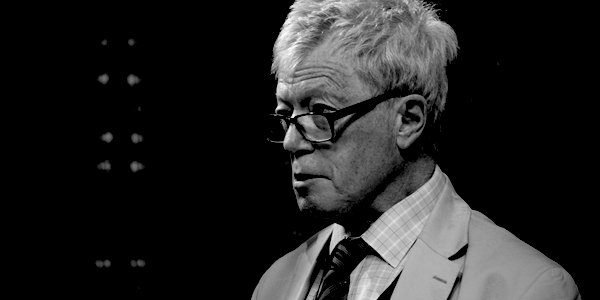RECENTLY, a friend was driving me to an event in the Wiltshire town of Malmesbury. I mentioned that Sir Roger Scruton had bought a property near there in the 1990s, a run-down farm. It was from this ramshackle holding that Scruton had set out on his journey home, an adventure which took place in the dimension of time, to be sure, but involved movement through spiritual, rather than physical space.
I mentioned also that Scruton’s wife, Sophie, was a direct descendant of the very committed Hanging Judge Jeffreys, and that they had met during a hunt when Roger, in ‘pursuit of the inedible’, had been thrown by his horse. I spoke of how this perfect High Tory union, and particularly its origin story, would have caused agitations at the dinner tables of North London. It’s nice to think that there is a part of Fabian Hampstead where it still does.
My prisoner thought I was nuts. He knew nothing about Scruton. He did, however, vaguely recall the name, in connection with that farm’s annual apple festival.
Roger would have been more than happy with that, I’d wager. His friends knew him as someone who was embarrassed by hagiography, and to be thought of as someone who somehow or other was attached to a local custom would have been pleasing to him.
In those final few decades of his life, Scruton’s writing sometimes took a form which I suppose we should classify as ‘intellectual memoir’. You’d be right if you sense some hesitation there. The boundaries between the contemplative and the practical sides of his soul were not etched in bold.
For example, in the preface to News from Somewhere, the story of his purchase of that farm, Scruton offers a tribute to the Cotswold clay, noting its longstanding resistance to all attempts to reconcile it with the ambitions of local agriculture. The writer in Scruton sees in the soil a version of historical record, a memoir of the gradual shifts of landscape and climate.
There is a lesson here for anybody attempting to craft an authentically conservative environmentalism as an alternative to the paganism of ‘Net Zero’ eschatology; that is, to dump the soulless globalist language so favoured by the political class and speak instead in the loving dialect of people who know, by acquaintance, the recalcitrant habits of local ecology.
Scruton writes with the affection and frustration of the practical farmer – as you’d expect, given he was one. From this perspective, he develops a philosophical theme, a ‘spirit of place’. If you can feel an attachment to this place here, affections towards family and country can be seen to follow naturally and irresistibly. This is the proper direction of emotional travel: from home outwards, not from the global inwards. Oikophilia, the love of home, originates in attachment to this piece of territory.
You also come to see that ‘homesickness’ is not a sickness at all, but a longing for the place where one ought to be. It is the earthen equivalent of that beautiful yearning which St Augustine captures in the early pages of his Confessions.
The connection between the metaphysical and the practical also informed his views concerning the nature of ethics. Scruton endorsed a virtue-centred conception of morality. The good life does not entail that we must internalise and periodically consult some rule book, even if written in the very plausible styles of Kant or Mill. Just as friendship with God is not limited to theologians, the happy exercise of virtue is available to all, even those less practised in the idiom of moral philosophy: ‘When Truth cannot make itself known in words, it will make itself known in deeds,’ he wrote.
It is now five years since Sir Roger Scruton moved on. This might be a good way to think of him: a man in whom action and wisdom were commingled, and as a philosopher who, in the way he lived, affirmed Aristotle’s contention that practical reasoning is as important as theorising in a life committed to flourishing.
We can see this in his activation and subsequent stewardship of those underground universities in communist Eastern Europe; in his subversion of the comfortable leftism of the New Statesman viahis wine column, written in the vernacular of High Culture conservatism, and rinsed in the benign prejudices thereof; or in the pleasure he found in the foxhunt itself, an experience he eulogised in Kantian terms, arguing that in the act of hunting we see ourselves as part of the order of the natural world, yet at the same time mysteriously set apart from it.
Sir Roger’s preferred example of this – the happy coming together of the theoretical and the practical – would come from the experience of music. To analyse the musical phenomenon is to be invited into discussions about time, space, personal identity and, most importantly, the nature of metaphor. This is because it is impossible to hear a piece of music except as if it involves a ‘movement’ through a metaphorical space. The internal logic of a composition is disclosed as much by playing it as by listening to it. The fullest explanation of the experience of listening to music unites analysis and practice.
I think these notions of movement and practice help to explain at least in part the character of Sir Roger Scruton. He was restless, intellectually and spiritually. This is why his ‘worldview’ is distributed across so many books and disciplines, even within philosophy. He was as comfortable writing about Wittgenstein’s ‘private language’ argument as he was about the role played by corks versus screw tops in the dynamics of companionship.
Counterintuitively, perhaps, this tendency to activism explains his conservatism, which, for Scruton, should never be an unconditional endorsement of stasis but an invitation to appropriate movement. The conservative knows that the more measured your walk, the less likely you are to bump into things, and the more pleasure you take in your surroundings.
Scruton’s personal restlessness found consolation in the act of ‘settling’, which only sounds paradoxical. He wrote often of the proper conception of love – what St Paul called agape – as an activity, an act of the will, and not a mere feeling. This, he suggested, is how the conservative should live, to seek out things to love and conserve, not to be on a mission of repudiation and casual, irreversible destruction.
This is the best way to be remembered, for the ‘little’ things which actually matter, those made possible by home. To be thought of not as the greatest philosopher England has produced, but as the father and husband who opened his farm up on annual apple picking day.










